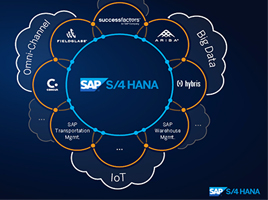When companies choose an enterprise resource planning system (ERP), one of the main factors they consider is whether they should use an on-premise or cloud solution. Today, cloud ERPs are more popular than ever, and many ERP vendors offer some cloud deployment options. Some companies have even shifted their specialization to cloud software completely.
However, many businesses still have some solid reasons to choose on-premise systems. The thing is that both on-premise and cloud solutions have their advantages and disadvantages so every company needs to analyze all the pros and cons, determine their objectives, and make an informed decision.

Cloud ERP and On-Premise ERP: What’s the Difference?
The main difference between these two types of systems is the way they are deployed. On-premise software needs to be installed locally so users must have their servers and computers to run these solutions. Cloud-based ERP systems are hosted on the vendor’s servers. Users can access cloud software through web browsers.
Cloud and on-premise solutions also have quite different pricing plans. Usually, users subscribe to cloud software on a monthly or annual basis. On-premise software is purchased once, which is a reason why on-premise solutions are considered large investments upfront, or capital expenditure. Cloud solutions are an operating expenditure, as the organization continues to pay an additional cost when using it.
The difference in pricing approaches determines the cloud’s low entry cost. This is probably the main reason why cloud solutions became so popular. According to statistics, 93% of enterprises are currently using cloud-based system architectures or software. The adoption of hybrid software, which is a type of cloud software hosted on a company’s private servers, also increased to 58%.
However, as we’ve already mentioned above, both on-premise and cloud solutions have their advantages and disadvantages so you shouldn’t use a cloud ERP simply because someone else does it. Let’s take a closer look at cloud ERP pros and cons so that you can understand whether or not such software will fit your objectives and meet your requirements.
Benefits of Cloud-Based ERP Software
- Easy
to maintain
One of the main benefits of cloud ERP systems is that you don’t need to hire an internal IT team to maintain it. The vendor will do it for you, updating backups automatically and maintaining its hardware. Given that you don’t have to use your hardware, maintenance becomes the provider’s responsibility. Therefore, you can save a lot of money. - Low
initial costs
Another considerable advantage of cloud ERP systems is that they don’t require you to make large upfront investments, as you would do with on-premise solutions. Instead of purchasing an expensive license once, you can pay a monthly or annual subscription price. - Remote
access
Another advantage of cloud-based ERP software is an opportunity to access your data from anywhere, at any time. The increased visibility will be especially appreciated by big companies that have many facilities. Thanks to the ability to access your data from anywhere, you can quickly check your purchase orders, inventory, and schedule, saving a lot of time. Therefore, cloud-based solutions increase the overall efficiency of many business processes.
Disadvantages of Cloud-Based ERP Systems
- Security
issues
The main drawback of cloud-based solutions is that the provider can access your data. Many companies have lots of sensitive data, and accessing it requires a high level of clearance. This is a reason why many defense and aerospace vendors choose on-premise solutions. “When your data can be accessed from anywhere, there is a potential risk of hackers stealing your clients’ data. Of course, most cloud services have various high-end protection systems, but it’s important to always compare benefits and possible risks,” notes Meg Robertson, a cybersecurity expert at a writing service reviews website Online Writers Rating. - Ownership
When you’re using a cloud ERP, you don’t own your software. As a result, the provider implements any updates across the board, no matter whether you want it or not. Many companies might need to prepare for updates and even provide employees with some additional training, but with cloud-based software, there’s no time for preparation. - Unexpected
costs
Another problem with cloud ERP solutions is that they can cost more over time. Many solutions of this type are modular, so the more modules you activate, the more you need to pay. Besides, if you pay monthly fees long enough, these costs can surpass a one-time investment that you would make when choosing on-premise solutions. - Internet
connectivity
Last but not least, if you’re using a cloud ERP system, you’re heavily dependent on the stability of your internet connection. To access the system, you must have a stable internet connection so you must choose an internet provider carefully.
Wrapping Up
Even though cloud software becomes more and more popular, it doesn’t mean that everyone must choose a cloud ERP. Choosing an ERP for your company is a very important task so you should make sure to weigh all the pros and cons before making a decision. Cloud ERP systems offer many benefits, but we recommend that you choose a system for your company based on your objectives and the specifics of your organization. Some companies will appreciate the accessibility of the cloud, while others might choose the reliability and security of on-premise solutions.







